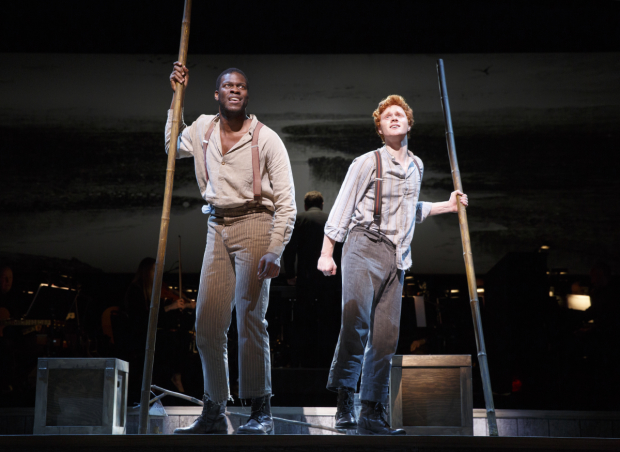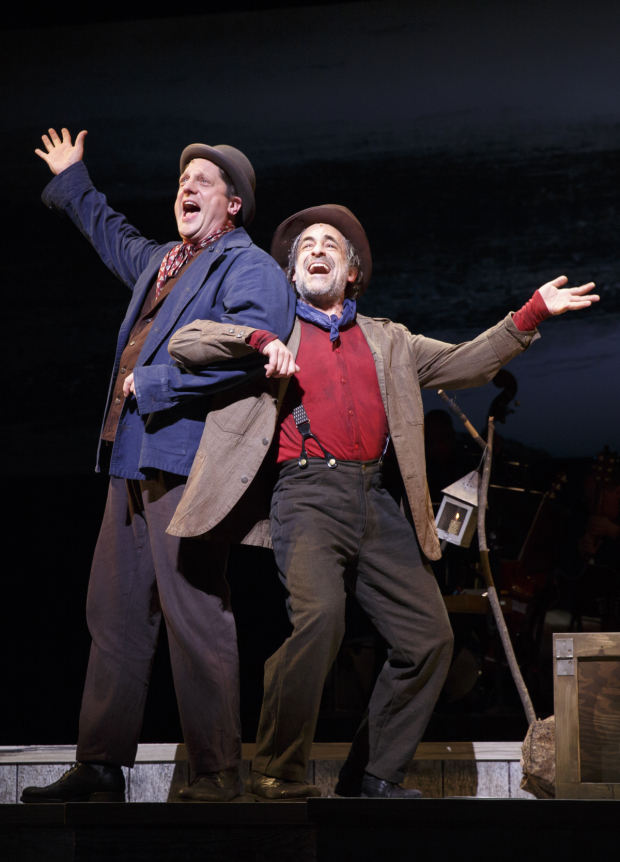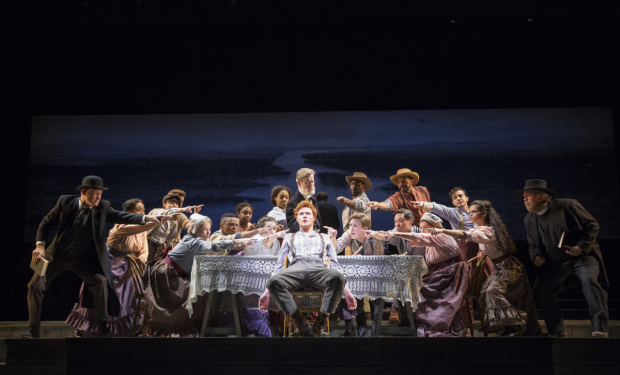
(© Joan Marcus)
I write this review at my own risk, fully aware of the sign hanging over the stage at New York City Center that reads, "Persons attempting to find a motive in this narrative will be prosecuted; persons attempting to find a moral in it will be banished; persons attempting to find a plot will be shot." What's left to write about? This ornery warning first appeared in Mark Twain's classic novel Adventures of Huckleberry Finn, which provides the basis for Roger Miller and William Hauptman's Big River. That surprise 1985 Broadway hit is now receiving a revival from Encores!, where it sounds better than ever.
Since the show was revived on Broadway in 2003 by Deaf West Theatre, Big River doesn't seem like the most obvious choice for Encores!, a series that regularly features musicals that have never been revived. Of course, the show does have personal significance to artistic director Jack Viertel: Producer Rocco Landesman first met Viertel after the then-critic wrote a scathing review of the La Jolla run.
Beyond that, music director Rob Berman makes a good argument for the show's inclusion, garnering a rich sound from Miller's unique country music score. We New Yorkers feel temporarily transported to the Grand Ole Opry.
It proves to be the perfect underscoring for the story of Huckleberry Finn (Nicholas Barasch), a poor boy who discovered a large sum of money with his best friend, Tom Sawyer (Charlie Franklin). While it earns interest in the bank, his adoptive mothers, Miss Watson (Annie Golden) and the Widow Douglas (Cass Morgan), attempt to "civilize" him, teaching him to read, bathe, and fear God. Huck finds it all stifling, but he feels equally oppressed when his drunkard father (Wayne Duvall) comes around to claim him (and his money). Huck fakes his own death and runs away to Jackson's Island, where he finds Jim (Kyle Scatliffe), a slave owned by Miss Watson who has also escaped. Together, they plan to float a raft down the Mississippi River until it meets the Ohio at Cairo, then catch a steamboat north until Jim lands in the free states.
As is the case with every novel-turned-musical, the creators of Big River faced a daunting task in attempting to crystalize Twain's sprawling tale into two and a half hours of musical entertainment. Hauptman's book does the job better than most, editing the story down to a couple of essential plotlines and preserving Twain's folksy yet cynical perspective through Huck's narration.

(© Joan Marcus)
As a couple of con artists masquerading as European royalty, David Pittu and Christopher Sieber are the living embodiment of Twain's skepticism of humanity. They're also really funny. Sieber's Duke, a vagrant actor, treats us to a bombastic Shakespeare casserole. Pittu's King is a man of ever-shifting accents, an act that is a lot harder to pull off than he makes it look.
We understand how timeless Twain's grasp of American archetypes was when we see Duvall's performance as Pap Finn. His rendition of the song "Guv'ment" is a whiskey-soaked fusion of soul and resentment.
Lauren Worsham gives a noteworthy performance late in the show as Mary Jane Wilkes, leading two numbers with her powerful and expressive vocals.
Ultimately, it is up to the title character to hold the show together: Barasch is undeniably charming as Huck and he really knows how to sing. Unfortunately, he has a tendency to speak certain words under his breath in a manner more suggestive of a moody bit player on Growing Pains than a poor river kid from antebellum Missouri.
Scatliffe gives the standout performance of the evening: His delivery is vocally spectacular and he seems to sweat urgency from his pores. His Jim keeps his eagle eyes trained on the horizon, always on the lookout for slave hunters.
Lear deBessonet's production captures the matter-of-fact cruelty of the world according to Twain: Lines that make a modern audience blush are delivered without so much as a second thought. She smartly recognizes that we will underline them with our gasps.
Allen Moyer's set of moving wooden platforms creates the river and its various craft onstage. A giant photograph of the Mississippi occupies the upstage wall. Lighting designer Paul Miller uses it to give a sense of the time of day and atmospheric conditions. It's an obvious choice, but the production really benefits from the presence of a big river hanging over the orchestra.

(© Joan Marcus)
As is often the case in Encores!, the music is the real star: Rob Paparozzi puts his heart into the harmonica and mouth harp, pianist Alvin Hough Jr. gives the gospel numbers extra heft, and tireless Broadway fiddler Martha McDonnell (Bright Star) has some choice solos. Everything comes together for Miller's distinctive country and bluegrass sound, which keeps our toes tapping throughout the evening.
Short of ascribing any morals or motives behind Huck Finn, it is safe to say that this story endures in the American imagination because of Twain's ability to marry clear-eyed observations of human wickedness with a persistent sense of fun. Big River presents all that in an all-American package: the book musical.








